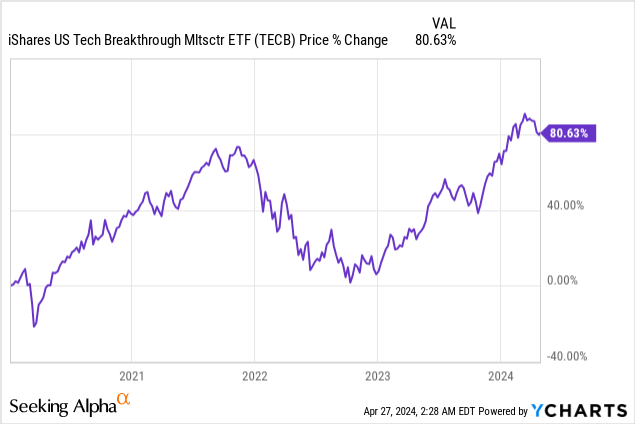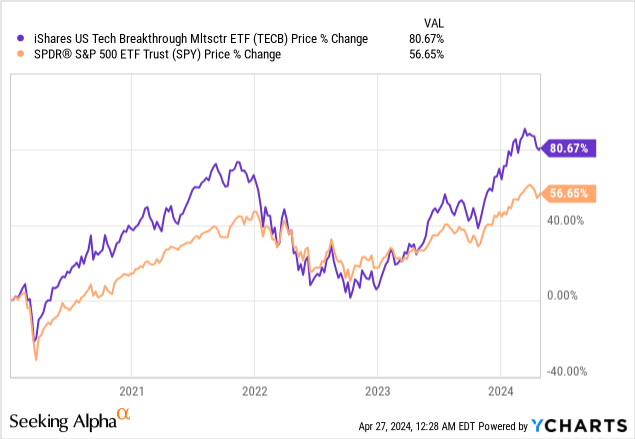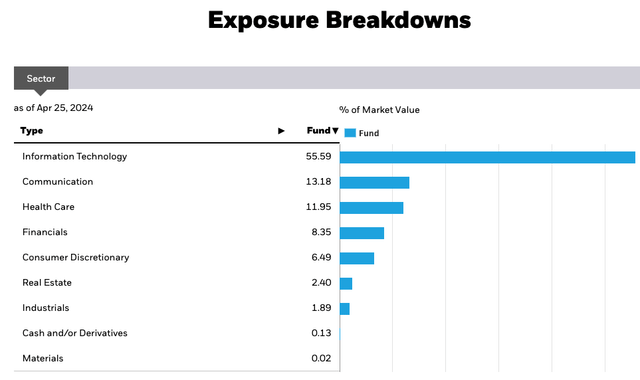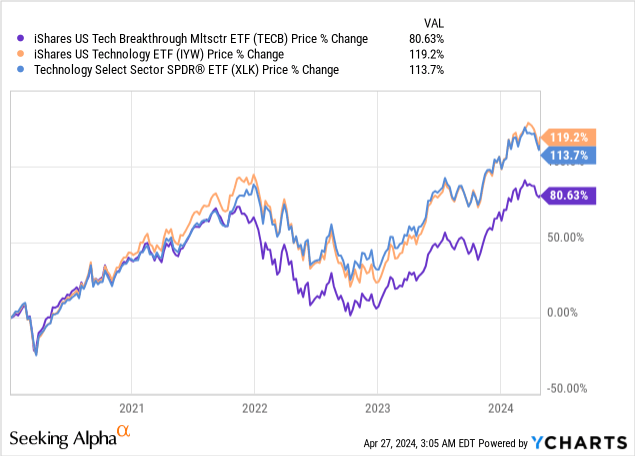monty laxen
ETF overview
iShares US Tech Breakthrough Multi-Sector ETF (NYSEARCA:TECB) owns a portfolio of large-cap U.S. stocks that benefit from a variety of breakthrough technologies. These breakthrough technologies include robotics, artificial intelligence, cloud and data centers, cybersecurity, genomics, immunology, and financial technology.This means that TECB's portfolio is It will include not only the information technology field but also other fields. However, this diversification may not yield better returns in the long run, as the growth potential of other sectors still lags far behind the information technology sector. Therefore, we believe that long-term growth investors should continue to focus on traditional technology ETFs that focus solely on the information technology sector.
Y chart
Fund analysis
TECB generally outperforms the S&P 500 in bull markets but underperforms in bear markets
TECB is a relatively new ETF, with its launch date in 2012. January 2020. Therefore, you can only see the performance for the last four years. In fact, it has performed extremely well since its inception in 2020, significantly outperforming the S&P 500 Index. As you can see from the graph below, the stock price has increased over 80% since its inception. In contrast, the SPDR S&P 500 ETF (spy(which tracks the S&P 500 index) is up only about 56.7%. The fund generally outperformed the overall market in bull markets and underperformed in bear markets. Like the broader market, TECB fell sharply for most of 2022, underperforming the S&P 500 index due to the Federal Reserve's aggressive interest rate hikes. As soon as the market turned positive, TECB also outperformed the S&P 500 index since its lows in October 2022.
Y chart
A more diverse portfolio than traditional technology ETFs
Unlike traditional technology ETFs, which focus primarily on companies developing innovative technologies, TECB is more diversified. As you can see from the chart below, TECB's portfolio also includes companies in the telecommunications, healthcare, financials, consumer goods, real estate, and industrial sectors. Information technology companies still account for approximately 55.6% of the total portfolio, while other sectors also account for 44% of the total portfolio. For readers' information, stocks in the Information Technology sector of the company's portfolio include NVIDIA (NVDA), Microsoft (MSFT), Salesforce (CRM), and Advanced Micro Devices (AMD). Other notable non-tech companies in TECB's portfolio include Merck (MRK), which is in the healthcare sector, and Visa, which is in the financial sector.
ishares
Should you own TECB instead of a traditional technology ETF?
For investors who want to own a fund that outperforms the overall market, TECB may be a good choice, as it has recorded better returns than the S&P 500 index since its inception. The question is whether this fund is a good alternative to traditional technology ETFs. Look at the table below to answer this question. This chart compares TECB to two of his other technology ETFs, iShares US Technology ETF (IYW) and Technology Select Sector SPDR ETF (XLK). As you can see from the graph, both IYW and XLK have outperformed his TECB over the past four years. In fact, IYW and XLK achieved price-to-earnings ratios of 119.2% and 113.7%, respectively. In contrast, TECB's price-to-earnings ratio was only 80.6%.
Y chart
This difference may be due to the fact that TECB includes not only technology stocks but also stocks from various low-growth sectors. For example, the healthcare and financial sectors account for approximately 12% and 8.4% of TECB's total portfolio, respectively. However, these two sectors typically have lower long-term earnings growth rates than the information technology sector. Yardeni Research regularly collects analyst consensus on earnings and growth forecasts for all S&P 500 index constituents. Based on collected information published on April 26, 2024, the consensus for current year earnings growth for the Healthcare and Financial sectors is approximately 9.3% and 7.8%, respectively. While this growth may sound robust, the consensus revenue growth rate for the Information Technology sector is expected to be around 17.1% in 2024. This is much better than the healthcare or financial sectors. In fact, the information technology sector has outperformed the healthcare and financial sectors even in the past few years. Therefore, funds such as IYW and XLK that focus solely on the information technology sector are likely to continue to outperform TECB's more diversified portfolio over the long term.
Key points for investors
We believe TECB is a better fund to own than the S&P 500 index because it is likely to continue to outperform the broader market. Although its portfolio is more diversified than traditional technology ETFs, its long-term returns may be poorer than traditional technology ETFs. Unless diversification is important to you, long-term investors who only care about returns should own traditional technology ETFs rather than TECB.




